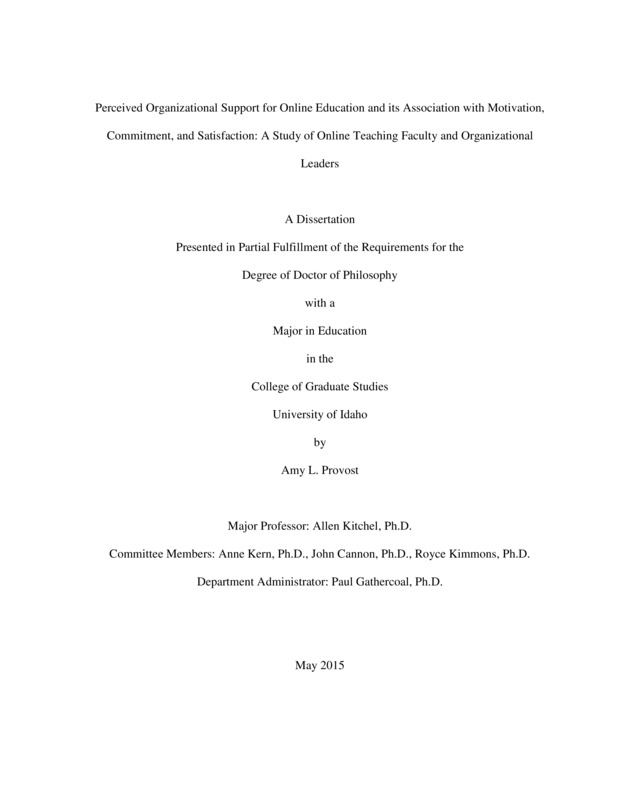Perceived Organizational Support for Online Education and its Association with Motivation, Commitment and Satisfaction: A Study of Online Teaching Faculty and Organizational Leaders
Provost, Amy L.. (2015). Perceived Organizational Support for Online Education and its Association with Motivation, Commitment and Satisfaction: A Study of Online Teaching Faculty and Organizational Leaders. Theses and Dissertations Collection, University of Idaho Library Digital Collections. https://www.lib.uidaho.edu/digital/etd/items/provost_idaho_0089e_10578.html
- Title:
- Perceived Organizational Support for Online Education and its Association with Motivation, Commitment and Satisfaction: A Study of Online Teaching Faculty and Organizational Leaders
- Author:
- Provost, Amy L.
- Date:
- 2015
- Keywords:
- Distance Education Higher Education Online Faculty Online Learning Organizational Support Theory Perceived Organizational Support
- Program:
- Curriculum & Instruction
- Subject Category:
- Higher education; Higher education administration
- Abstract:
-
Problem: Online educational organizations demands highly qualified online teaching faculty who are motivated, committed and satisfied. Little research exists that examines faculty and organizational leaders’ perceptions of organizational supports for online education and how that relationship is consistent with organizational support theory. Organizational support theory (Eisenberger, Huntington, Hutchison, & Sowa, 1986) considers the development, nature, and outcomes of perceived organizational support (POS) and forms the theoretical framework for this study.
Research Questions: Are online faculty perceptions of instructional support different from that of organizational leaders of online programs, and, is there a significant predictive relationship between faculty perception of organizational support and motivation, commitment, and satisfaction associated with online education. Research Method: The study methodology involved a survey based cross-sectional descriptive research design.
Data Collection and Analysis: Participants were selected through a simple random selection process from the population of faculty teaching online courses during fall 2014 at five land grant universities in the northwest region of the United States and the department chairs and/or deans of these faculty. Online faculty and organizational leader’s perceptions toward nine organizational support constructs were analyzed using an independent samples t-test (α = .05).
Findings: Seven of the nine organizational constructs were found to be statistically different with online faculty perceiving lower organizational support with an average of about .7 points different on a seven point scale. A multiple linear regression was used to determine the relationship between the nine organizational constructs and faculty commitment, motivation and satisfaction. Incentives, online pedagogy assessment, rewards, course conversion, and technology training were found to be significant predictors for online faculty commitment, motivation, and satisfaction.
Conclusions/Recommendations: Those who teach within the virtual environment need the assistance of the organization to provide the necessary organizational support so they can effectively teach online. These supports include appropriate rewards, incentives, and assessment of work as well as proper technology, personnel support, and opportunities for professional development. With an understanding of these supports, focused efforts to provide support that improve faculty commitment, motivation, and satisfaction will lead to higher quality work and reduces employee turnover.
- Description:
- doctoral, Ph.D., Curriculum & Instruction -- University of Idaho - College of Graduate Studies, 2015
- Major Professor:
- Kitchel, Allen
- Committee:
- Kern, Anne; Cannon, John; Kimmons, Royce
- Defense Date:
- 2015
- Identifier:
- Provost_idaho_0089E_10578
- Type:
- Text
- Format Original:
- Format:
- application/pdf
- Rights:
- In Copyright - Educational Use Permitted. For more information, please contact University of Idaho Library Special Collections and Archives Department at libspec@uidaho.edu.
- Standardized Rights:
- http://rightsstatements.org/vocab/InC-EDU/1.0/

